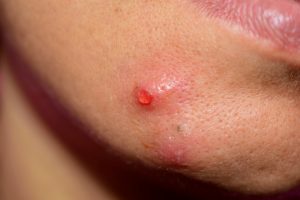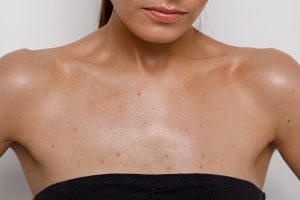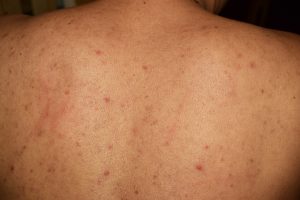¿Qué es el acné de embarazo?
Pregnancy acne is a common skin concern for many expectant mothers, and for good reason! This annoying condition can cause red, inflamed bumps to appear on the skin, and can be a source of frustration and insecurity for moms-to-be.
Hormonal changes during pregnancy can lead to an increase in oil production, which can cause acne to flare up or worsen. Additionally, the use of certain medications and skincare products may be limited during pregnancy, making it difficult to treat acne effectively. In this article, we will discuss the causes of pregnancy-related acne, how it can be managed, and safe treatment options.

One of the primary causes of acne during pregnancy is an increase in androgen hormones, which stimulate oil production in the skin. These hormones are present in both men and women, but they are present in higher levels in men. Acne often worsens because of large swings in these hormones.
¿Cómo se ve el acné por embarazo?
El acné por embarazo se presenta con puntos blancos y puntos negros (comedones), protuberancias rojas, protuberancias de pus y nódulos (quistes).
¿Cuándo inicia el acné por embarazo?
Muchas mujeres que tienen acné antes del embarazo notan que su acné fluctúa en el primer trimestre cuando los niveles hormonales aumentan antes de estabilizarse en el segundo y tercer trimestre. El acné del embarazo a menudo empeora justo después del parto (período posparto), cuando los niveles de estrógeno bajan.
¿Dónde se localiza el acné por embarazo?
Pregnancy-related acne typically appears on the face, neck, chest, and back, and it can range from mild to severe.

¿Por qué es difícil el acné por embarazo?
El acné puede causar muchos problemas de salud mental, como depresión y ansiedad. Hay muchos medicamentos para el acné en el mercado, pero la información sobre los efectos de estos medicamentos en el feto y el bebé en desarrollo es limitada. Por lo general, las mujeres embarazadas y lactantes quedan excluidas de los ensayos clínicos. La mayor parte de la información disponible sobre el potencial de defectos de nacimiento de estos medicamentos se obtiene de casos de exposición accidental, donde una mujer usó los productos antes de saber que estaba embarazada.
¿Cómo se puede tratar el acné durante el embarazo?
There are several ways to manage pregnancy-related acne and reduce the risk of breakouts. One of the most important is to maintain a consistent skincare routine that includes cleansing, toning, and moisturizing. It is important to choose products that are formulated for acne-prone skin and are safe to use during pregnancy.
Gentle cleansing is key to maintaining healthy skin during pregnancy. It is important to avoid using harsh cleansers or scrubs, as they can strip the skin of its natural oils and exacerbate acne. Instead, opt for a gentle, oil-free cleanser that is formulated for acne-prone skin.
Toning can help to balance the pH of the skin and tighten pores, which can help to reduce the risk of acne. It is important to choose a toner that is alcohol-free, as alcohol can be drying and irritating to the skin.
Moisturizing is an important part of any skincare routine, and it is especially important during pregnancy when hormone levels are fluctuating. Choose a moisturizer that is oil-free and non-comedogenic, meaning it will not clog pores.

In addition to a consistent skincare routine, it is important to maintain a healthy diet and lifestyle during pregnancy. A diet rich in fruits, vegetables, and whole grains can help to support healthy skin, while a diet high in sugary and processed foods can increase the risk of acne. It is also important to stay hydrated by drinking plenty of water, as hydration is key to maintaining healthy skin.
While it is generally safe to use over-the-counter acne medications during pregnancy, it is important to check with a healthcare provider before starting any new treatment. Some acne medications, such as retinoids, are not safe to use during pregnancy and can cause birth defects. Salicylic acid and benzoyl peroxide are two commonly used over the counter acne medications but their safety in pregnancy has been questioned.
Your dermatologist may recommend a prescription medication. It is important to discuss the potential risks and benefits of any medication with a healthcare provider, as some prescription medications may not be safe to use during pregnancy.
Topical Medications
Como regla general, los agentes tópicos como cremas y geles son más seguros que los medicamentos orales para usar durante el embarazo y la lactancia, porque la absorción en el torrente sanguíneo es mínima. La eritromicina, la clindamicina y el metronidazol son geles antibióticos que generalmente se consideran seguros para usar durante el embarazo y la lactancia. También se cree que el ácido azelaico es seguro durante el embarazo. Cuando se aplica a la piel, la absorción es básicamente cero.
Los retinoides son medicamentos a base de vitamina A e incluyen el muy popular Retin-A y el retinol de venta libre. Por lo general, NO se consideran seguros durante el embarazo debido al riesgo de defectos de nacimiento.
Medicamentos orales
La eritromicina por vía oral ha sido clásicamente el medicamento de elección cuando se necesita un medicamento fuerte para el acné durante el embarazo. Aunque en su mayoría es seguro para su uso, ha habido algunos informes de problemas cardíacos y hepáticos fetales. La azitromicina es otro medicamento oral que también es seguro y efectivo. Los antibióticos como la doxiciclina y la minociclina, que comúnmente se recetan a mujeres que no están embarazadas, NO deben usarse durante el embarazo porque pueden causar problemas en los huesos y los dientes del bebé en desarrollo.
Zinc supplementation is a safe and effective way of controlling acne during pregnancy. Studies have consistently proven that at doses below 75 mg/day no harm is posed to the growing baby. Pretty much everything else by mouth is not safe in pregnancy including the commonly prescribed medications isotretinoin (Accutane) and spironolactone. After pregnancy while breastfeeding, an estrogen-containing birth control pill is quite effective, especially if your acne is worsened during your period and the week leading up to it.
Entonces, ¿cómo puedo solucionar mi acné por embarazo?
Un régimen sugerido para tratar su acné durante el embarazo y la lactancia sería: para el acné leve a moderado, hable con su proveedor de My Skin of Color sobre la prescripción de ácido azelaico. Los antibióticos tópicos como la clindamicina o la eritromicina también son seguros. Para el acné más severo, la eritromicina o la azitromicina por vía oral son seguras durante el embarazo y la lactancia. La suplementación con zinc también es segura y eficaz para el acné de cualquier gravedad. Una vez que dé a luz, considere comenzar con un método anticonceptivo a base de estrógeno, que también puede ayudar mucho. Por supuesto, hable con su proveedor de dermatología y obstetra/ginecólogo antes de tomar cualquier decisión, ya que puede haber factores personales que favorezcan el uso de un medicamento sobre otro.

Other general tips for acne in pregnancy include:
- Keep your skin clean: Wash your face twice a day with a gentle, oil-free cleanser. Avoid scrubbing or over-drying your skin, as this can irritate acne and make it worse.
- Use non-comedogenic products: Choose skincare products that are labeled “non-comedogenic,” which means they won’t clog your pores. This can help prevent acne from forming in the first place.
- Moisturize regularly: Pregnancy acne can be exacerbated by dry skin, so make sure to moisturize regularly to keep your skin hydrated. Choose a lightweight, oil-free moisturizer to avoid clogging your pores.
- Avoid picking or squeezing acne: It can be tempting to try and pop your acne, but this can actually make the problem worse. Picking or squeezing acne can lead to scarring and further inflammation, so try to resist the urge.
Pregnancy acne is a common and frustrating problem, but with the right skincare routine and some patience, you can manage it and keep your skin looking healthy and glowing.
Pacientes residentes de NY y Florida pueden empezar una consulta para acné por embarazo haciendo click abajo.

